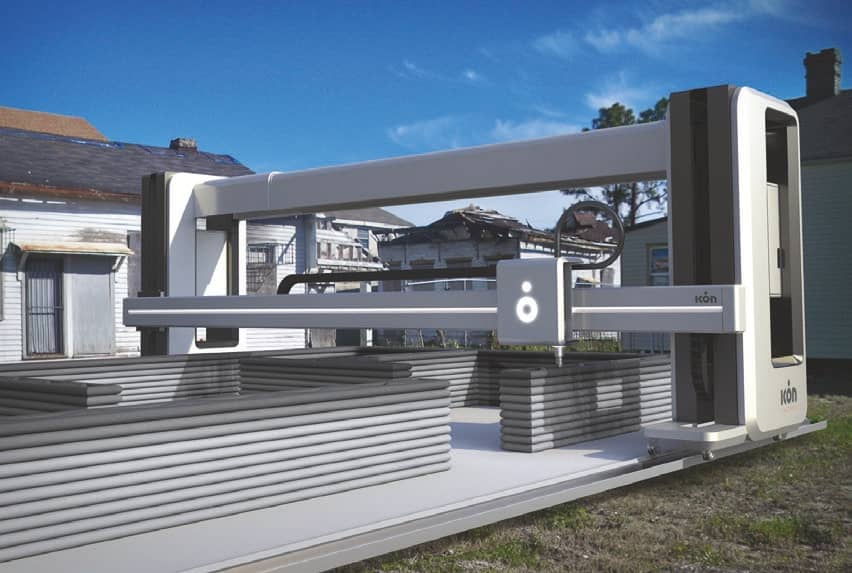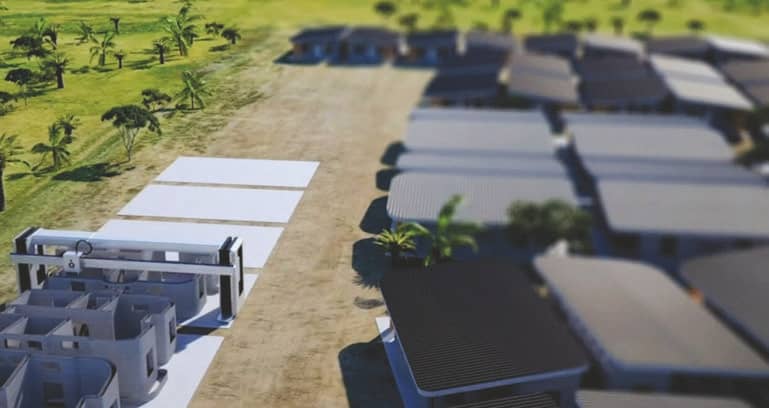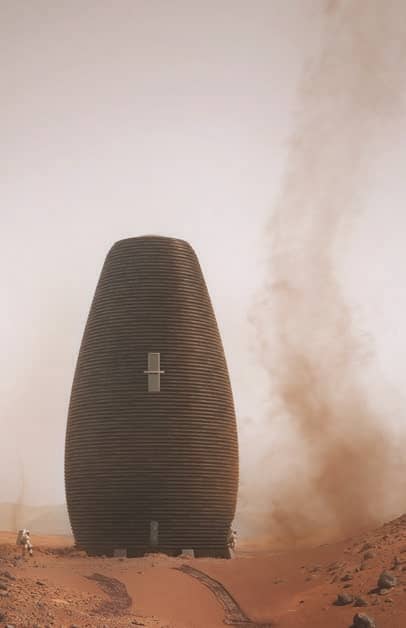Printing Big
Muse Science Magazine for Kids
|November/December 2019
WHO’S THE BIGGEST MAKER OF THEM ALL?

Make it from gold. Make it from cake. Make it from clay; frost it then bake. Makers use all kinds of materials. Today, creative entrepreneurs are using technology to build and test new ideas quickly and inexpensively. What technology is that? Additive manufacturing, or 3D printing. With some software and a machine that can print layers of plastic or metal, glass or ceramic, or even cookie dough, anyone can design and print almost anything and become a maker.

WHAT CITIES ARE MADE OF
Make it from concrete? Why not! Concrete is an inexpensive, rocklike building material. It is the most-used human-made material on Earth. For every person on the planet, roughly one ton (2,000 lbs) of concrete pours into projects each year. All of this concrete helps people build infrastructure. Infra . . . what? Infrastructure is the way society meets people’s needs. It’s our cities, homes, schools, roads, hospitals, airports, railways, seaports, water supplies, cell towers, and much more.

Much of our infrastructure is made or partially made of concrete. This isn’t a new idea. Long ago, the Romans used a type of concrete to build a sophisticated and elaborate network of roads and aqueducts (elevated waterways). In the modern world, infrastructure and concrete still go together. They are critical to our everyday lives. Can you see a role for 3D printers in building new, much-needed infrastructure?

Diese Geschichte stammt aus der November/December 2019-Ausgabe von Muse Science Magazine for Kids.
Abonnieren Sie Magzter GOLD, um auf Tausende kuratierter Premium-Geschichten und über 9.000 Zeitschriften und Zeitungen zuzugreifen.
Sie sind bereits Abonnent? Anmelden
WEITERE GESCHICHTEN VON Muse Science Magazine for Kids

Muse Science Magazine for Kids
ANIMAL FIREFIGHTER TO THE RESCUE
Can animals help manage the risks of deadly wildfires?
3 mins
Muse July 2025: The Story Behind Wildfires

Muse Science Magazine for Kids
FIRE DANGER
WHY THE RISK OF WILDFIRES KEEPS GROWING
4 mins
Muse July 2025: The Story Behind Wildfires

Muse Science Magazine for Kids
The Miller NEW Normal
WHAT TODAY’S WILDFIRES TELL US ABOUT OUR FUTURE
8 mins
Muse July 2025: The Story Behind Wildfires

Muse Science Magazine for Kids
WOMEN AND FIREFIGHTING: A GOOD FIT
Jessica Gardetto is a firefighter. Her father was, too. “I grew up with my dad coming home smelling like wildfire and covered in soot,” she says.
1 min
Muse July 2025: The Story Behind Wildfires

Muse Science Magazine for Kids
What is happening on your fingertips when they get all wrinkly in a hot tub?
—Felix G., age 10, Montana
1 mins
Muse July 2025: The Story Behind Wildfires

Muse Science Magazine for Kids
WHEN the SMOKE CLEARS
THE LINGERING EFFECTS OF THE RECENT PACIFIC PALISADES AND ALTADENA EATON FIRES
6 mins
Muse July 2025: The Story Behind Wildfires

Muse Science Magazine for Kids
PICKING TEAMS
Keep it fair with a strategy that relies on geometry.
2 mins
Muse July 2025: The Story Behind Wildfires

Muse Science Magazine for Kids
SHAN CAMMACK
WILDLIFE BIOLOGIST AND FIRE SAFETY OFFICER
3 mins
Muse July 2025: The Story Behind Wildfires

Muse Science Magazine for Kids
Scientists Create Mice With Woolly Mammoth-Like Fur
RESEARCHERS AT A COMPANY IN TEXAS ARE WORKING TO CREATE A LIVING ANIMAL THAT RESEMBLES THE EXTINCT WOOLLY MAMMOTH. Recently, they produced mice with traits of the large mammal. The mice all have coats with mammoth-like fur, and some of the small mammals also have genes that help them store fat. Both features would help the animals survive in the cold Arctic, where the woolly mammoth once lived.
1 min
Muse July 2025: The Story Behind Wildfires

Muse Science Magazine for Kids
Cool Sunshade Added to the Nancy Roman Space Telescope
THE NANCY ROMAN SPACE TELESCOPE IS A NEW TELESCOPE THAT NASA IS BUILDING AND WILL LAUNCH INTO SPACE, LIKELY IN EARLY 2027.
1 min
Muse July 2025: The Story Behind Wildfires
Translate
Change font size

